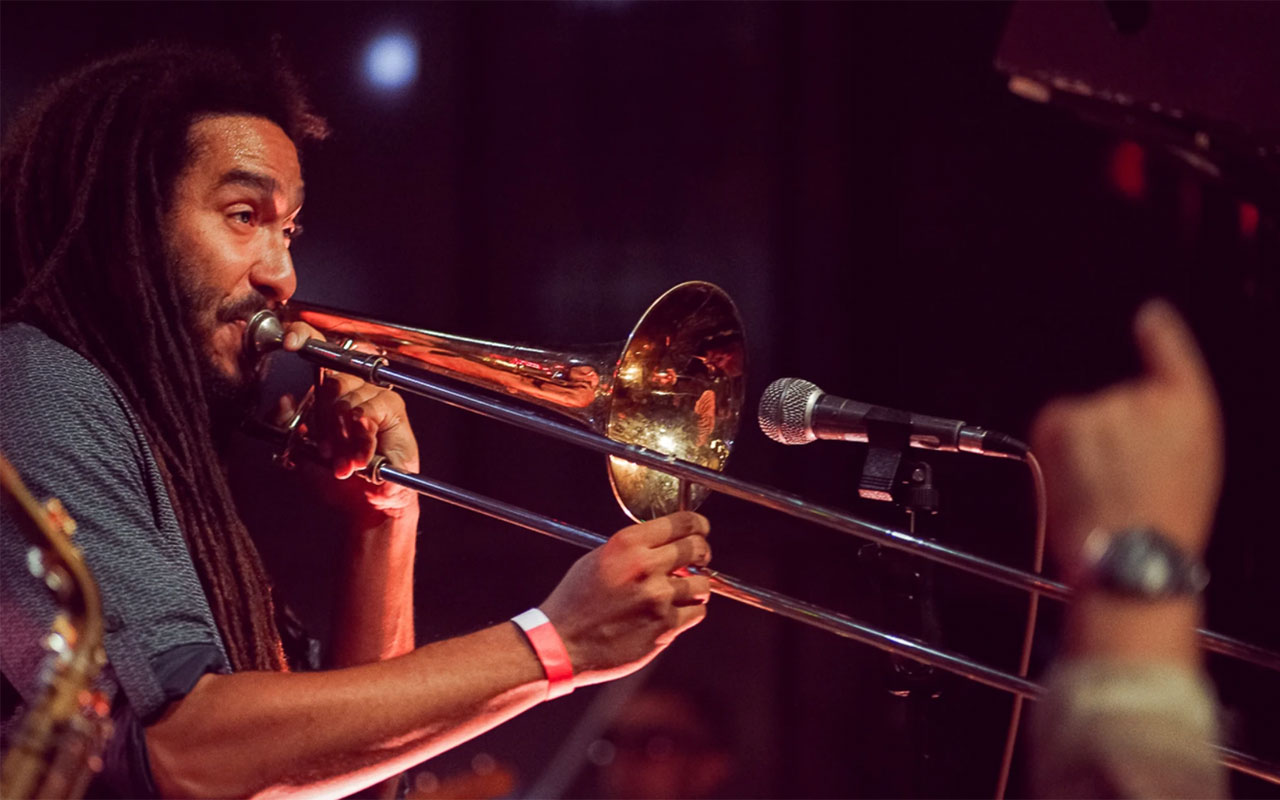
Freddy Fuego Gonzalez photo courtesy of the artist
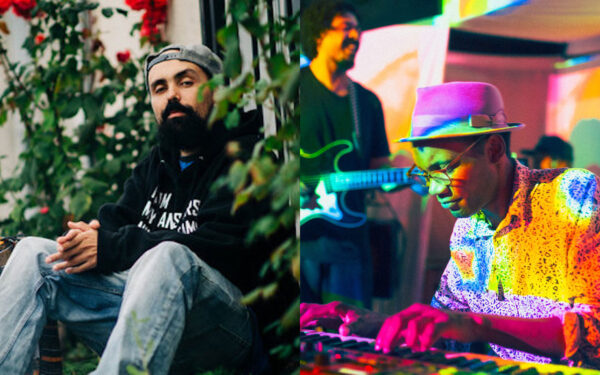
Gabriel Teodros photo by Naomi Ishisaka and Afrocop feat. Carlos Tulloss and Noel Brass Jr. by Mike Monaghan
TUESDAY, OCTOBER 22, 7:30PM
LANGSTON HUGHES PERFORMING ARTS INSTITUTE
Gabriel Teodros/ Afrocop
Sponsored by BECU. Welcomed by KNKX. Co-presented with LANGSTON Seattle.
$12-30. Tickets
BY NADYA BARGHOUTY
Gabriel Teodros is a cornerstone in Seattle’s creative community. Whether it be music, writing, or youth-focused workshops, the South Seattle native has been creating and building community for over a decade. Locals may even remember him from his radio show Early on KEXP which played five days a week from 2020 to 2023, or co-teaching a course at the University of Washington. However, Teodros’ impact goes far beyond his Beacon Hill neighborhood. The Seattle rapper has been performing and igniting the hearts of audiences all around the world.
Teodros’ came onto the scene in 2001 with his hip-hop duo Abyssinian Creole, featuring MC Khingz, DJ WD4D, and producer Kitone. Teodros continued to make a variety of music with friends like Khingz and other Seattle musicians. Teodros has received countless praise from many reputable publications. In regards to Lovework, his solo debut, Rolling Stone referred to Teodros as someone who “has brains, musicality and a refreshing attitude.” His 2018 album, History Rhymes If It Doesn’t Repeat, had NPR marking Teodros as “one of the bravest rappers currently working in Seattle.” He has several bodies of work and a deeply profound way of discussing our most human feelings through music.
Showgoers can enjoy Teodros perform with a band featuring three other prized Washington-based musicians. In addition to Teodros, the four-piece will consist of Camilo Estrada on bass, Chris Patin on drums, Darrius Willrich on keys, and Ahamefule J. Oluo on trumpet.
The Seattle psychedelic jazz trio Afrocop (Noel Brass Jr., keys; Andy Sells, drums; Carlos Tulloss, bass) will be supporting Teodoros and co. According to The Stranger, Afrocop “continue[s] to pump out the sonic coolness… a brooding beauty of spectral jazz funk, reinforcing my belief that Afrocop are one of Seattle’s most engrossing and subliminally psychedelic bands.” Similar to Teodros, Afrocop also explores themes core to the human experience, such as love and longing.
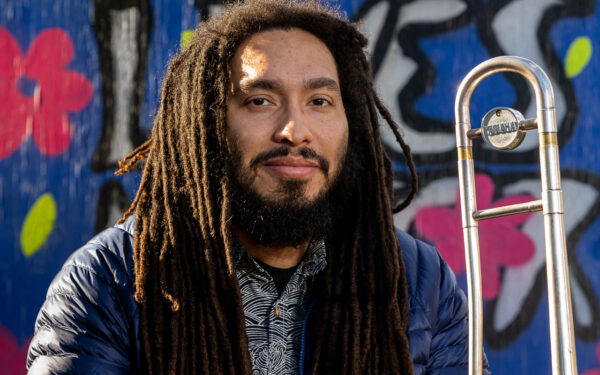
Freddy ‘Fuego’ Gonzalez photo by Daniel Sheehan
WEDNESDAY, OCTOBER 23, 7:30PM
LANGSTON HUGHES PERFORMING ARTS INSTITUTE
Freddy ‘Fuego’ Gonzalez
Sponsored by BECU. Co-presented with LANGSTON Seattle.
$12-35. Tickets
BY ERIC OLSON
Each year, Earshot Jazz commissions at least one Puget Sound musician to compose and perform an original work during its fall festival. This year’s commission went to trombonist Freddy ‘Fuego’ Gonzalez, who says he’s “really excited that people want to hear what I have to share.”
Gonzalez’s composition, a full musical suite for a 20-piece orchestra, will debut at the Langston Hughes Performing Arts Institute on October 23. He’s been leading the Freddy Fuego Big Band at Columbia City’s Royal Room for about a year and says he’ll use that experience to inform his orchestral conduction. After studying film scoring at the Berklee School of Music’s Valencia campus, Gonzalez moved to Seattle, having seen it firsthand during an internship with Stanwood-based television composer Ron Jones in 2018. Writing his Earshot string arrangements, he says, has helped him “stretch some of those old muscles.”
“I’d like to call it cinematic jazz,” Gonzalez says of the new suite. “Similar to the Big Band, we take old school instrumentation and put it over Afrobeat, reggae, and hip-hop grooves. I see this as the next adaptation of jazz, putting together all these different influences. I don’t like feeling limited by one genre for two hours.”
Gonzalez notes that the suite can be altered mid-performance based on the energy of his band or the crowd. “The order of the songs is never in stone. We have complete open sections, solos and things. But I like to use solos to connect different sections, or different tunes, rather than have 24 measures of the same progression.”
Gonzalez’s Earshot performance is the first-ever iteration of his Freddy Fuego Orchestra. He’s worked with many of these musicians before – in his groups and others – and used referrals to flush things out. “I’ve gotten a lot of gigs like that,” he says. “I lean on my musicians as much as they let me.”
Apart from his ongoing compositional work, Fuego is a new father who hosts the “Jazz Caliente” show Saturdays on KNKX. “I’m still learning,” he says of his radio career. “Mostly, I’m just trying to be myself.”
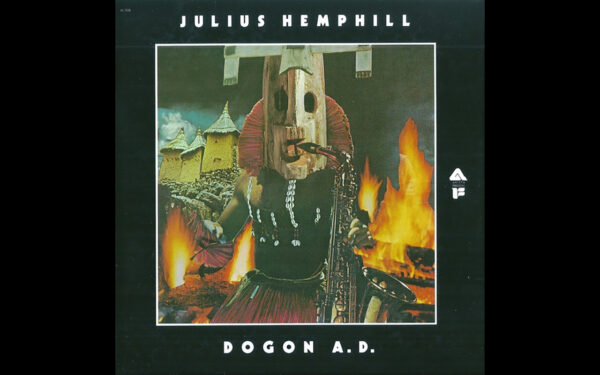
WEDNESDAY, OCTOBER 23, 7:30PM
THE ROYAL ROOM
What’s Going On Festival: Conduction, Improvisation, and the Culture of Structure
Julius Hemphill’s Dogon A.D.
St. Louis, Chicago, LA and New York
Presented by the South Hudson Music Project. Co-produced with Earshot Jazz, Nonsequitur, and Seattle Modern Orchestra. Major funding from the Live Music Society.
$20-25. Tickets
BY M.V. SMITH
Released in 1972, the saxophonist and flutist Julius Hemphill’s debut Dogon A.D. is one of the most indelible albums in the history of the jazz avant-garde. Alongside compatriots like the Art Ensemble of Chicago, the at-the-time St. Louis-based Hemphill and Baikida Carroll (trumpet), Abdul Wadud (cello), and drummer Phillip Wilson (a veteran of both the Art Ensemble and The Paul Butterfield Blues Band) developed an earthy Midwestern variant of free jazz, setting the gutbucket cries of Hemphill and Carroll atop the bluesy bed of Wadud’s cello — plucked as often as bowed — and Wilson’s relaxed, off-kilter grooves.
Out of print for many years before International Phonograph’s 2011 reissue, Dogon A.D.’s lasting influence can be heard in much of our era’s most acclaimed jazz, from Vijay Iyer’s ingenious piano trio setting of the title track on Accelerando, to the intertwined cello and trumpet textures of the late Jaimie Branch’s groove-focused band Fly or Die. Tonight’s tribute to Dogon A.D. features Seattle’s D’Vonne Lewis on drums, Vancouver, B.C. cellist Peggy Lee, recent University of Washington hire Stephanie Richards on trumpet, and Hemphill protégé Marty Ehrlich on saxophone.
Cornetist and conductor Butch Morris, like Hemphill, a veteran of the 1970’s downtown New York avant-garde, created the distinctive musical technique of Conduction, in effect composing new pieces by guiding the improvisations of large ensembles with his own system of hand and baton signals.
Seattle composer and Royal Room co-owner Wayne Horvitz, Morris’s close friend, has over the years become one of conduction’s foremost practitioners, leading frequent performances by the fifteen-piece Royal Room Collective Music Ensemble (RRCME), founded to explore Horvitz’s take on his mentor’s musical language. Tonight, members of the RRCME and special guests perform conductions of pieces by Hemphill, the Art Ensemble, and their fellow jazz iconoclasts Sun Ra, Cecil Taylor, Ornette Coleman, and Carla Bley.
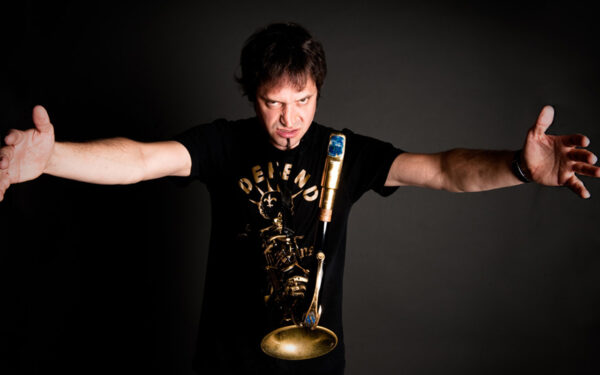
Skerik photo by Michael Weintrob
WEDNESDAY, OCTOBER 23, 8PM
CHAPEL PERFORMANCE SPACE
Skerik
BY MATTHEW ADKINS
Reading through Seattle saxophonist Skerik’s list of accomplishments, you have to wonder how he has time for it all. He’s toured and performed with everyone from John Scofield to Roger Waters to Reggie Watts. He’s recorded with top-tier artists from every conceivable musical genre. He’s helped found nearly a dozen different groups. Somewhere in the midst of it all, he’s found time to develop an entirely new approach to music—“saxophonics,” release an extensive body of his own work, and advocate for a number of causes like music education and voting awareness. And OK, that’s forty years worth of a hall-of-fame career, but it’s a ridiculous list all the same.
Then you see Skerik play, and you understand. This is a dynamo. The man imbues every note, every phrase, every piece of music with energy and passion that defy description. It isn’t just about performance either. Skerik’s knowledge of jazz—and truly, of music—is encyclopedic, allowing him to fuse a dizzying array of complex ideas into a radically singular sound. Skerik preaches a gospel of jazz that refuses to live in the past, and he walks that walk every time he picks up the sax. On and off the stage, Skerik is high octane all the time, pushing limits, pushing boundaries, pushing himself to extremes. As he’s described it, “Safety is never guaranteed in these woods, but boredom will never rear its head.”
The Earshot Jazz Festival is twice lucky to have Skerik serve as its Artist in Residence this year. Lucky that he found time in his schedule to share his prodigious talent with us for two weeks, but lucky, too, that he’s now fully recovered from a recent shoulder injury that left him sidelined in late 2023. This particular set will feature him as a solo instrumentalist, along with digital projections by Blazinspace (Gardenia Theroux). It’s a unique opportunity to hear Skerik compress forty years of exploration and collaboration into a single focused point of energy.
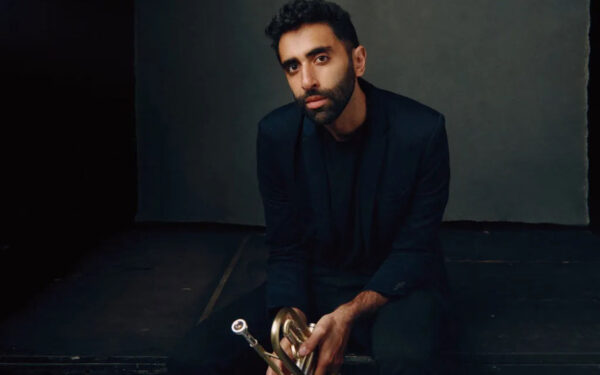
Riley Mulherkar photo by Zenith Richards
THURSDAY, OCTOBER 24, 7:30PM
LANGSTON HUGHES PERFORMING ARTS INSTITUTE
Riley Mulherkar
Sponsored by BECU. Co-presented with LANGSTON Seattle.
$12-40. Tickets
BY ANDREW MEYER
Trumpeter, Riley Mulherkar, uses the fertile ground of the traditional American Songbook and his own highly melodic inventions in light and playful combination with subtle electronic manipulation to create a sound that is both instantly recognizable as squarely rooted within the tradition of jazz trumpet mastery and also a fresh and confidently unique approach to the instrument. His warm and breathy tone is evocative of many West Coast trumpeters of the past and his gift for melodic playing is augmented by his frequent use of repetitive figures. Mulherkar has a wide sonic palate of extended techniques, which often takes his ballad playing in dreamy, textural directions.
A 2020 recipient of Lincoln Center’s Emerging Artist Award, Riley Mulherkar has appeared with many leading jazz artists, including Wynton Marsalis and Dee Dee Bridgewater. He is a founding member of the genre-defying and critically acclaimed brass quartet, The Westerlies, which blends jazz with folk and modern classical music. Originally from Seattle, Mulherkar earned both a bachelor’s and master’s degree from The Juilliard School. In addition to his busy performing schedule, Mulherkar is an active advocate for the arts, with past work as an ambassador for Jazz at Lincoln Center’s “Jazz for Young People” program, director of the Summer Advanced Institute at Seattle JazzED, and founding the Joye in Aiken Jazz Camp. He is currently serving as a faculty member at the College of Performing Arts at The New School.
Riley Mulherkar will bring his quartet comprised of Chris Pattishall (piano, programming/sound design), Joshua Crumbly (bass), and Jason Burger (drums). Mulherkar’s 2024 release, Riley, which also features Pattishall, is an intimate and intriguing dance between the quartet and the studio production, which highlights thoughtful sound design and sophisticated though understated electronic processing of Mulherkar’s rich trumpet tone. The album was highlighted by The Boston Globe in an article titled, “The 20 best albums of 2024 (so far).”
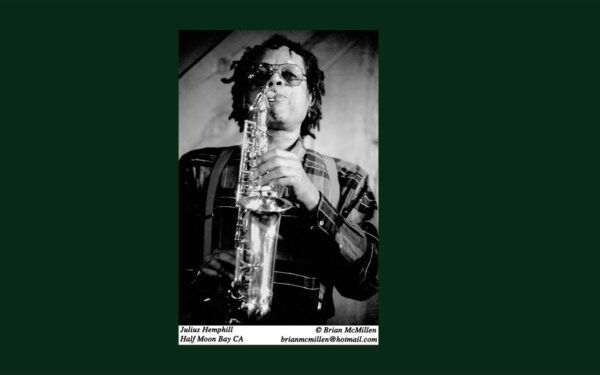
THURSDAY, OCTOBER 24, 7:30PM
THE ROYAL ROOM
What’s Going On Festival: Conduction, Improvisation, and the Culture of Structure
Kin of the Moon Open
Strings Orchestra
Julius Hemphill, the Saxophone Sextets
Presented by the South Hudson Music Project. Co-produced with Earshot Jazz, Nonsequitur, and Seattle Modern Orchestra. Major funding from the Live Music Society.
$20-25. Tickets
BY M.V. SMITH
Since joining forces in 2017, Seattle chamber jazz ensemble Kin of the Moon, featuring Kaley Lane Eaton (vocals, piano, electronics), Leanna Keith (flute), and Heather Bentley (viola, violin, bass), has focused on the sheer physicality of sound. The saxophonist Neil Welch’s No house on fire, no., commissioned by the trio, combines conventionally scored passages with extended techniques — blowing into the flute without engaging pitch, scraping the keyboard with guitar picks — guided by the cadences of Joan Naviyuk Kane’s poem “Drawn Together” and the instrumentalists’ interpretations of graphic notations developed specifically for the piece. Other works delve into the sonic possibilities of technology. In Atmokinesis, Eaton filters the improvisations of Keith and Bentley and her own field recordings through software-generated signal processing, sculpting sound in real time. For tonight’s performance, the trio transforms into the Kin of the Moon Open Strings Orchestra, joining forces with cellist Peggy Lee, alto saxophonist Darius Jones, and vocalist/pianist Robin Holcomb to perform improvised conductions led by Seattle composer Wayne Horvitz and the acclaimed trumpeter Stephanie Richards.
The pioneering alto saxophonist Julius Hemphill is probably best known for his tenure in the World Saxophone Quartet (WSQ), the all-reed, no-rhythm-section ensemble he formed with baritone saxophonist Hamiet Bluiett, tenor saxophonist David Murray, and fellow altoist Oliver Lake that combined exploratory skronk with a more accessible jaunty, bluesy swagger. In the years before his 1995 death, Hemphill expanded the quartet concept into a sextet, performing his compositions as part of the group on 1991’s Fat Man and the Hard Blues, and, weakened by illness, ceding the alto chair to Tim Berne on 1994’s Five Chord Stud. Like his work in the WSQ, Hemphill’s sextet pieces are joyous celebrations of the saxophone’s sonic possibilities, building exuberant, buzzing polyphony atop simple repeated phrases. For tonight’s performance, Jones joins Hemphill disciple Marty Ehrlich to perform a variety of Hemphill’s sextets alongside Seattle luminaries Neil Welch, Jory Tindall, Alex Dugdale, and Earshot Festival Resident Artist Skerik.

Friday, OCTOBER 25, 7:30PM
THE ROYAL ROOM
What’s Going On Festival: Conduction, Improvisation, and the Culture of Structure
Julius Hemphill: Compositions for Jazz Orchestra
Electric Circus “Nublu”
Presented by the South Hudson Music Project. Co-produced with Earshot Jazz, Nonsequitur, and Seattle Modern Orchestra. Major funding from the Live Music Society.
$25-30. Tickets
BY PAUL RAUCH
The Royal Room Collective Music Ensemble (RRCME) has been a steady presence on Monday nights at The Royal Room in Columbia City, under the baton of Wayne Horvitz. Horvitz uses a unique system of conducting referred to as “Conduction,” a methodology developed by Lawrence Douglas “Butch” Morris. Morris’s system enables structural improvisation, with Horvitz conjuring sounds, dynamics, and singling out soloists from the podium like a good third base coach in baseball flashing signs to impact the nuance of the game. The band has a rotating cast, of sorts, but built around a solid core of some of Seattle’s best improvisers. Generally speaking, the band’s Monday night sets include originals from Horvitz and the compositions of Thelonious Monk. The music is generally swinging, not standard fare for the usually avant-leaning Horvitz.
For this performance, Horvitz employs the band and adds his second ensemble interest, Electric Circus. The Royal Room Collective Music Ensemble delves into the compositions of free jazz composer and saxophonist Julius Hemphill, while Electric Circus will celebrate “The Conduction of Groove,” employing the aforementioned methodology of structural improvisation created by Morris. Horvitz is ably assisted by talents that include Geoff Harper, David Marriott, Jr., Eric Eagle, Ryan Burns, Neil Welch, Kate Olson, Abbey Blackwell, and a host of other guests.
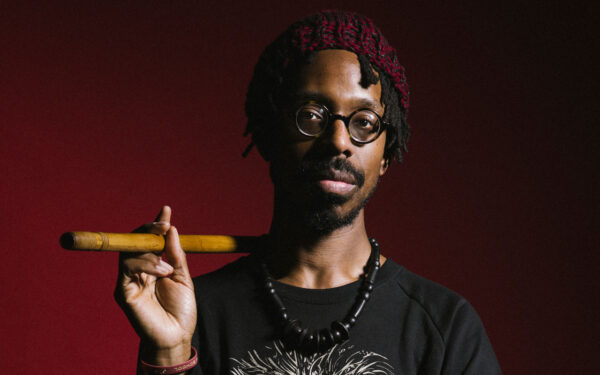
SHABAKA by atibaphoto
FRIDAY, OCTOBER 25, 8PM
TOWN HALL SEATTLE, Great Hall
SHABAKA
Sponsored by Seed IP. Welcomed by KNKX. Presented in partnership with Town Hall Seattle.
$12-55. Tickets
BY PAUL RAUCH
It would be very difficult to hear the music of Shabaka for the first time, without any prior knowledge of his work, and interpret the sounds as having anything to do with jazz. His work with his previous bands, Sons of Kemet and The Comet Is Coming, could offer clues along the way. Yet with only a faint connection with the blues, the listener is drawn down a path whose destination creates distance between these sounds and what has been, and continues to be, revolutionized as the height of artistry in Black American music.
Born in London and raised in Barbados, Shabaka set out in the music world as a saxophonist, probing the sounds around him and his own imagination with that same instrument that had summoned spirits like Charlie Parker, John Coltrane, and Wayne Shorter. Even after achieving a degree of artistic excellence on his instrument of choice, Shabaka decided to put a hold on performing publicly on the instrument beginning in 2024. He would focus almost completely on flutes, most commonly the ancient Japanese shakuhachi as well as Mayan Teotihuacan drone flutes, Brazilian pífanos, Native American flutes, and South American quenas. Clarinet would be included in performances.
The music that has resulted does not have the biting, hard edge that can be conjured from the saxophone. The music became softer, elemental in many ways, incorporating instruments such as harp to create what Shabaka describes as “sonic poems.” His most recent release on Impulse, Perceive Its Beauty, Acknowledge Its Grace, presents this vision in eleven, somewhat small, poetic portions. So much of the talk about the album, and Shabaka’s instrumental transition described it as “genre-bending,” or “defying genre” – an idea that ignores the value of the actual music. Playing “outside of genre,” is not in itself innovative. It doesn’t require a pioneering spirit, one such that Shabaka seems to have in abundance. Hearing sounds, exploring curiosities, and pursuing them musically with other artists is not about a genre, including jazz. But it very much invokes the spirit of jazz in its reactionary prose verse to verse, in the living moment. Defining genre, or undefining it, is not the focus, for it is more an objective that serves as answers to several inquiries: Does it stir the human soul? Does it invoke beauty? Does it take us to a place that gives us a glimpse into the spirit of humanity?
Shabaka himself may not be able to answer all these questions, but he will continue to dig, and dig some more. His Earshot appearance will feature a band that includes harpist Charles Overton and electronic soundscapes artist Chris Sholar. Bassist Burniss Travis and drummer Austin Williamson assure that the vibe will be very ambient in nature.
Shabaka’s current state of affairs, at this point in his career, is a statement of courage and a salute to wonderment. His music has always included a narrative of character, something to consider aside from his musical prowess. How this musical honesty carries forward is probed with each performance and catalogued by each recording. How listeners perceive and internalize the results will hold the true narrative in the end.

Day Soul Exquisite photo by Lily Wenbao. L-R Xiomara Mills, Lillian Minke Tahar, Thomas Arndt, Francesca Eluhu, Josh Pehrson, and Zora Seboulisa.
FRIDAY, OCTOBER 25, 8PM
LANGSTON HUGHES PERFORMING ARTS INSTITUTE
Day Soul Exquisite
Welcomed by KBCS. Co-presented with LANGSTON Seattle.
$12-35. Tickets
BY ANDREW MEYER
Seattle-based sextet, Day Soul Exquisite, present a heady blend of jazz, neo-soul, Caribbean, R&B, and punk feels mingled with radiant positivity, tender queer love themes, and defiant self-expression. The complexity of their arrangements showcases the band’s diversity of musical backgrounds and allows for nimble shifts between heavy grooves. Always colorful, and with a hearty helping of psychedelia, Day Soul Exquisite strikes a delightful balance between feel-good party grooves and thoughtful social commentary.
Coming from divergent musical worlds, Francesca Eluhu (vocals), Zora Seboulisa (vocals/bass/ guitar), Josh Pehrson (drums), Lillian Minke Tahar (keys/bass), Thomas Arndt (percussion/bass) and Xiomara Mills (saxophones), meld their unique sound through a culture of listening, sharing, and seeking, as well as a focus on sonic exploration and collective arrangement. The band shies away from genre conventions, preferring oblique reference to specific types of music. This is clearly heard on their 2024 release, Sanguine & Cardamom, where Latin grooves mingle with four-on-the-floor disco beats and ornate saxophone solos counterbalance distorted guitar riffs.
Listeners can expect songs to feel and sway to as well as songs to mosh to. Performances are kept fresh with extensive improvisation and a near-constant interest in the reworking of arrangements. Each member of the band brings a powerful intensity and sincerity to their live shows, which typically feature new material and a carefully curated handful of covers in addition to the band’s recorded material. The energy of these live performances can be seen on their recent live feature recording for KEXP Live In-Studio.
Day Soul Exquisite aims to take audiences on an emotional journey and help people reflect and recognize parts of themselves in their music. A grounding in radical love and acceptance inspires the band to build community by making audiences feel seen and heard, all while sending out a prismatic blend of genre-confounding, exotic neo-soul.
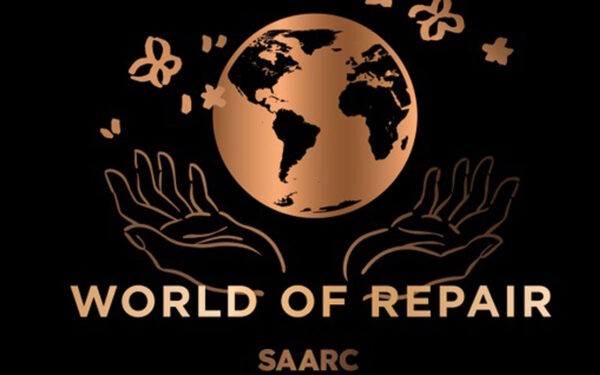
SATURDAY, OCTOBER 26, 6PM,
LANGSTON HUGHES PERFORMING ARTS INSTITUTE
World of Repair: SAARC Jazz Night
Join Seattle African American Reparations Committee (SAARC) and Earshot Jazz for a night of live music and civic conversation at World of Repair! Celebrate Seattle’s rich jazz legacy while learning why reparations to local Black communities are a crucial civic issue. The lineup features Robin Rue Simmons, Larry Gossett, Rep. Jamila Taylor, and more. Don’t miss this unforgettable evening of jazz, community, and action!
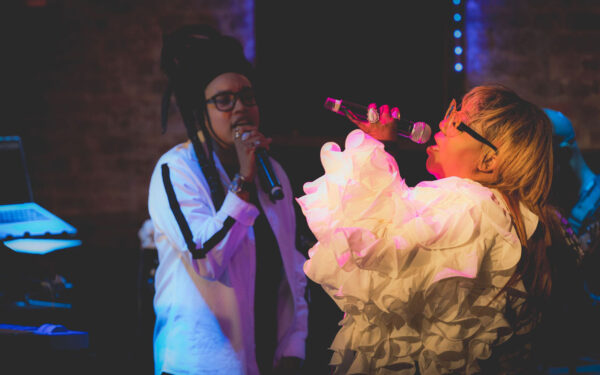
Asha Santee and Jennifer Patience Rowe photo courtesy of the artists
SATURDAY, OCTOBER 26, 3PM
LANGSTON HUGHES PERFORMING ARTS INSTITUTE
BOOMscat (Workshop)
FREE with RSVP More Information
Join BOOMscat as they take you on a journey through creating music unplanned, unrehearsed and unrevised.
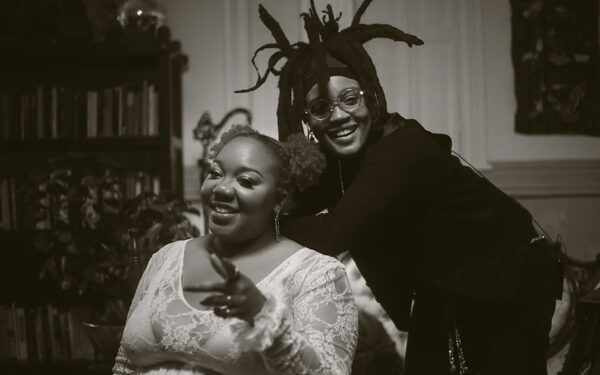
Jennifer Patience Rowe and Asha Santee photo courtesy of the artists
SATURDAY, OCTOBER 26, 8PM
LANGSTON HUGHES PERFORMING ARTS INSTITUTE
BOOMscat
Sponsored by Seed IP. Welcomed by KNKX. Presented in partnership with Town Hall Seattle.
$12-35. Tickets
BY AKSHAJ TUREBYLU
Twelve years ago, Asha Santee and Jennifer Patience Rowe formed the aptly named duo, BOOMscat. Since then, the two have played on the idea of embodying two poles, two spheres of influence — competing, playing, and riffing with ease off each other. Santee as BOOM — the explosive and commanding percussive blows of the keyboard and drums; Rowe as scat — sophisticated jazz lyricism translated into soulful strains. Their extended title, The Peace & Body Roll Duo BOOMscat, puts together calm with the athletic dance style of body roll.
It’s in assuming those personae that the two friends enter a contestation that drives their music to elevation, electrification, and elation. As a “one-man-backing,” BOOM stands behind a towering rig of synths and drum pads to orchestrate loops, chords, and adlibs, an R&B take on the church organist with a thousand keys and levers to pull. From that grand contraption emanates the intoxicating cloud of Neo-Soul groove which pulls you in close for scat to complete the charm with her intimate poetic vocals.
Born of DMV-area queer musical spaces, the two occasionally title their style of performance as “queer baby-making music.” It’s perhaps both a tease and warning, to know that you might not escape listening to their performance in person unscathed by desire. And it is in the concert hall that BOOMscat shine powerfully with scat bringing the presence of a classic blues diva and BOOM leaving you on your toes with celestial synth chord progressions.
The duo doubles their gifts by offering a free afternoon workshop at Langston Hughes Performing Arts Institute. You won’t want to miss this one.
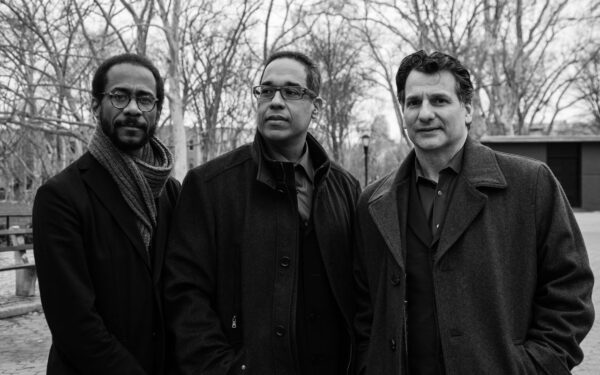
Brian Blade, Danilo Pérez, and John Patitucci photo by Anna Webber
SATURDAY, OCTOBER 26, 8PM
TOWN HALL SEATTLE, Great Hall
Danilo Pérez, John Patitucci, Brian Blade: Legacy of Wayne Shorter w/ special guest Mark Turner
Sponsored by BECU. Welcomed by KNKX. Support provided by Sharon Dworkin Bell & Peter H Bell. Presented in partnership with Town Hall Seattle.
$12-65. Tickets
BY PETER GRAHAM
When the careers of legendary artists begin to stretch across many decades, it becomes harder to know what to expect as a fan, listener, or audience member. Some opt to “play the hits,” others evolve while remaining in the confines of their mastered wheelhouse. For many bands and artists, this approach leads to wonderful live performances that present the finest iterations of expression in forms that they themselves pioneered. But for an artist like Wayne Shorter, who mastered the art of musical exploration and whose wheelhouse was ever-expanding, transformation and innovation always remained inevitable.
The quartet that Shorter formed with drummer Brian Blade, bassist John Patitucci, and pianist Danilo Pérez was never going to be a stationary celebration that rode on the coattails of his immense legacy. The group broke astonishing new ground over the following 24 years, as all of its members had done in their own rights prior to uniting under Shorter’s banner. With Shorter passing in March of last year, Zero Gravity now carries on not just his gargantuan musical legacy but also one which they defined together over the last quarter century.
Even in a genre defined by improvisational interaction between band members, it’s rare to hear a rhythm section that hears and reacts to one another in the way this group does. Blade’s reputation as a world class listener certainly contributes to this dynamic. He engages with his fellow musicians not by just parroting rhythms or trading referential solos, but by anticipating and reacting in highly varied yet universally perceivable ways. He and Patitucci lock together deep in the rhythmic pocket, but utilizing an expansive range of unique sounds and textures to do so.
This elite level of interactive listening between the band members allows grooves to come in and out of form, with single tunes containing multiple suites of rhythmic and dynamic variety. This variety is also enabled by the globe and era-spanning experiences of both Pérez and Patitucci. Fueled by roots in Latin American folk music, West African rhythms, and European impressionism, Pérez can masterfully shift between time feels and dynamics while maintaining total emotional coherence. Patitucci, who helped define contemporary jazz in the 1980s with Chick Corea and later with Herbie Hancock, drives with unstoppable rhythmic momentum, from high energy electronic fusion to delicate explorations that slowly take shape.
Stepping in on tenor saxophone is one of our great giants of the instrument, Mark Turner. A true saxophonists’ saxophonist, Turner’s singular improvisational voice and challenging compositional approach has been closely studied by aspiring jazz musicians since he broke onto the scene alongside other contemporary greats like Kurt Rosenwinkel, Brad Mehldau, Larry Grenadier, and Jeff Ballard. Turner’s improvisations move mind-bending harmonic shapes effortlessly through all manner of tunes, making him a natural fit with the forward-thinking improvisers of Zero Gravity.
Performing their own interpretations of Shorter’s compositions, this quartet seeks to honor his pivotal contributions to jazz and are sure to carry on his legacy—breaking new ground as they go.
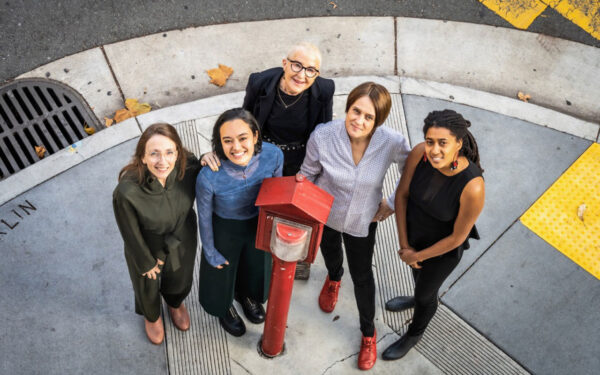
L-R Lesley Mok, Tomeka Reid, Myra Melford, Ingrid Laubrock, and Mary Halvorson. Photo by Don Dixon
SUNDAY, OCTOBER 27, 7:30PM
TOWN HALL SEATTLE, Forum
Myra Melford Fire and Water Quintet
Sponsored by BECU. Presented in partnership with Town Hall Seattle.
$12-40. Tickets
BY M.V. SMITH
The music of pianist and composer Myra Melford, professor of composition and improvisational practices at the University of California, Berkeley, considers the porous boundaries between jazz and modern chamber music.
Her Snowy Egret ensemble, featuring guitarist Liberty Ellman, a veteran of Henry Threadgill’s Zooid and JD Allen’s quartet, the pioneering acoustic bass guitarist Stomu Takeishi, the MacArthur Fellow Tyshawn Sorey on drums, and the late, great cornetist Ron Miles, earned acclaim for their complex improvisations that juxtaposed airy delicacy with cacophonous fury, a quality shared by the works on paper of abstract artist Cy Twombly, whose loose whorls of crayon and jagged pencil scribbles are evoked on the cover of 2018’s The Other Side of Air in a remarkable pastiche by designer Megan Craig.
With her Fire and Water Quintet, born from Melford’s 2019 residency at New York creative music stronghold The Stone, and named for a series of drawings by Twombly, Melford further explores the artist’s profound influence on her musical sensibilities. She recruited guitarist Mary Halvorson, cellist Tomeka Reid, saxophonist Ingrid Laubrock and drummer Susie Ibarra—all masters of their instruments and prominent bandleaders in their own right — to record 2022’s For the Love of Fire and Water, an album-length suite that combines composed sections for the entire band with impromptu dialogues between two or three musicians at a time.
On Hear the Light Singing, released late last year, Melford and crew, joined by new drummer Lesley Mok, further hone their intuitive interplay with an emphasis on melodies — halting, stately, playful— and sheer sonic texture. Melford’s unaccompanied Cecil Taylor-esque percussive skitter on “Insertion One” gradually transforms into a showcase for Laubrock’s floating soprano sax. While, on “Insertion Two,” Halvorson’s jittery arpeggios, delivered in her unmistakable pitch-shifted style, disrupt a plaintive melody from Reid, anchored by Mok’s delicate brushwork. Closing track, “Insertion Five,” epitomizes the quintet’s conception and adds a new wrinkle or two: Laubrock’s guttural gurgles and sputters lead into lurching, pensive phrases from Melford, Halvorson, and Reid followed by a passage of free drumming from Mok, and a thunderous clamber through a knotty melody — a moment of unalloyed joy.
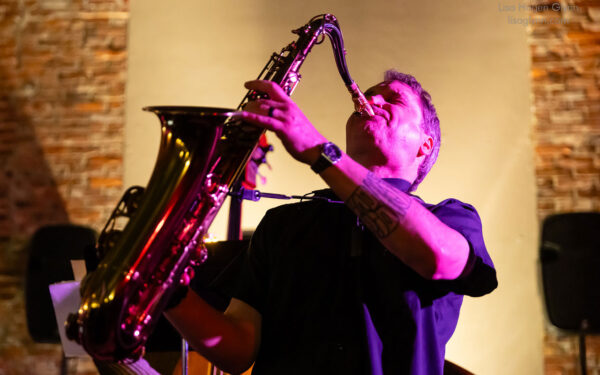
Skerik photo by Lisa Hagen Glynn
SUNDAY, OCTOBER 27, 8PM
THE ROYAL ROOM
Skerik Quartet feat. Johnaye Kendrick
BY MATTHEW ADKINS
If you’ve had the pleasure of listening to Johnaye Kendrick’s music or, even better, of hearing her perform live, you might find the idea that she’s joining the Skerik Quartet for a set at this year’s Earshot Jazz Festival an odd proposition. Skerik’s music and his persona might be described as “aggressive.” Kendrick’s performances are far softer, subtler, quieter.
There is depth to these two artists, though, that actually makes the idea of seeing them together rather tantalizing. A shared essence between last year’s Festival Resident Artist, Johnaye, and Skerik of this year’s. There’s no question. Skerik can be a boundary-pushing wildman, but his experimentation and exploration don’t always take the form of high-octane volume. The quartet he’s put together—Tim Kennedy on piano, D’Vonne Lewis on drums, and Geoff Harper on bass—is comfortable with a wide range of styles. Meanwhile, there’s a force that underlies Kendrick’s singing that, though subtle, is also deeply passionate. Kendrick’s physicality isn’t electric in the way Skerik’s can be, but there’s an energy written across her face with every note she sings. And while her music isn’t as boisterous as most of Skerik’s, her approach to individual songs can be profoundly experimental, whether she’s exploring a melody through scat or bending a note to see how far it can go. You can catch this unique collaboration at The Royal Room, there are sure to be fireworks.